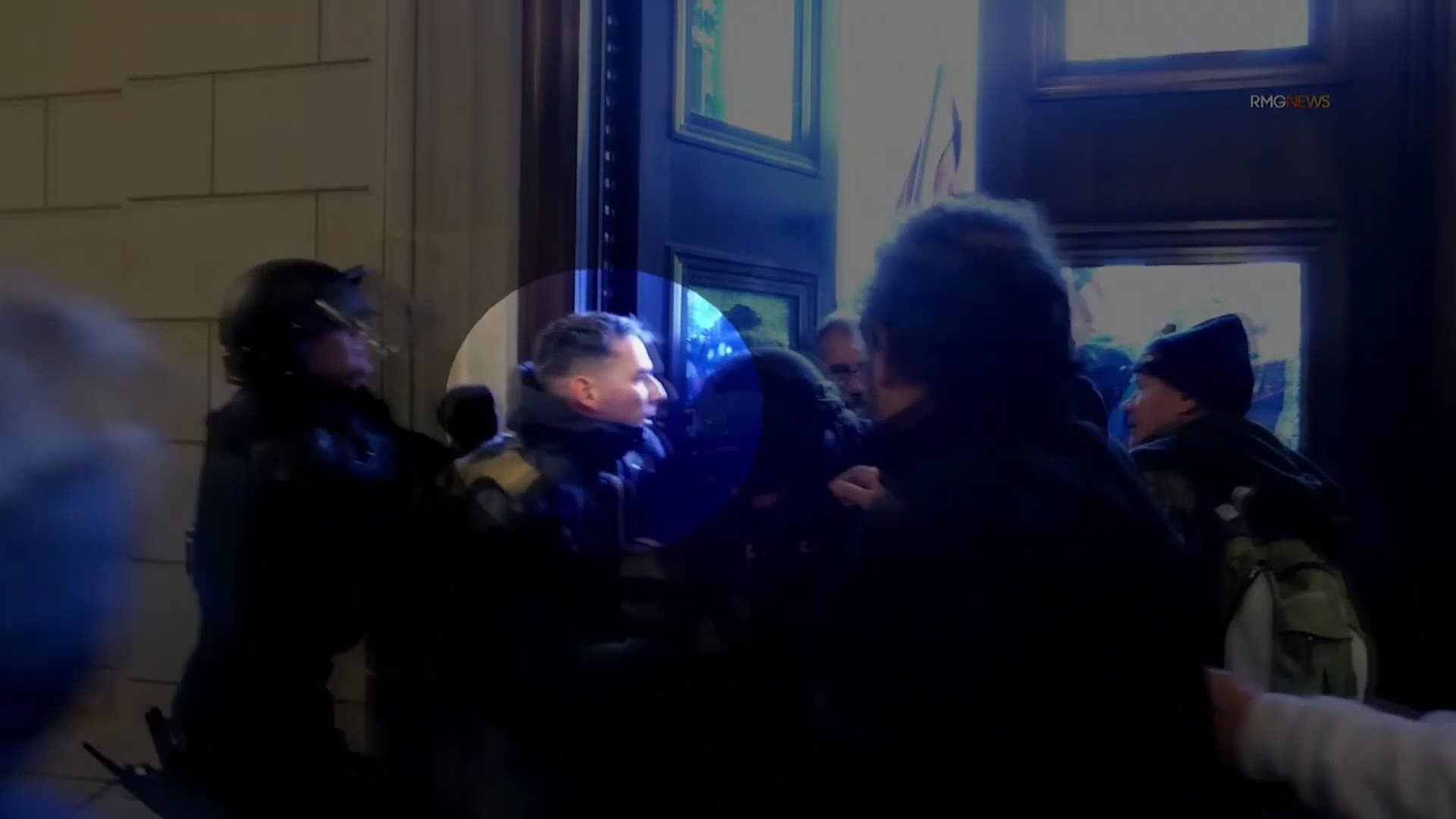WASHINGTON — A former U.S. Marine Corps major helped other members of a pro-Trump mob enter the U.S. Capitol while using his body to block police's attempt to close a breached entrance on Jan. 6, prosecutors told a federal judge Monday.
Maj. Christopher Warnagiris was the first active-duty service member to be charged in connection with the attack on the U.S. Capitol. He was arrested in May 2021 and indicted a month later on nine criminal counts, including felony counts of obstruction of an official proceeding, civil disorder and assaulting, resisting or impeding police.
At the time of his arrest, Warnagiris was a member of the Marine Air-Ground Task Force Staff Training Program at Quantico in Northern Virginia. He had previously served at least four deployments to the Middle East between 2004 and 2012 and was the recipient of three Navy and Marine Corps Commendation Medals, among other accolades. In 2013 he obtained the rank of field artillery officer. A Marine Corps spokesperson confirmed Friday that Warnagiris had been "separated" from the service in January 2022.
According to charging documents, Warnagiris was the first person to push past police and enter the Capitol through the East Rotunda doors after they were opened from the inside by other members of the mob. Once inside, investigators say, Warnagiris used his body to hold open the door and reached for others to help pull them inside even as a U.S. Capitol Police officer struggled to drag him away from the entrance. Warnagiris' indictment originally said he'd inflicted bodily injury on the officer, but that language was later removed.
Warnagiris began a bench trial Monday before U.S. District Judge Paul Friedman. During opening arguments, prosecutors said he was willing to "cross the metaphorical Rubicon" on Jan. 6 and that he'd described a plan for Republican members of congress to object to certification of Electoral College votes as "the last constitutional off-ramp before violence solves the problem for us."
Warnagiris' attorney, Marina Medvin, argued prosecutors had presented Friedman with a "gross mischaracterization" of the evidence. She said video would show Warnagiris attempting to calm the crowd inside the Capitol and him saying over and over again outside that he was being "crushed" by the force of the mob. Medvin represents several other Jan. 6 defendants in their cases, including former DEA agent Mark Ibrahim, who is still awaiting trial.
After opening arguments, the remainder of the day was taken up entirely by testimony from Assistant U.S. Capitol Police Chief Thomas Lloyd. Lloyd, who has testified as a key witness for the government in dozens of Jan. 6 trials, walked through video of the riot and Warnagiris' path once inside the Capitol. After entering the building, Warnagiris can be seen behind a group of people who were attempting to enter the House Chambers. Prosecutors argued the video helped prove Warnagiris' intent was to disrupt the joint session of Congress and, ultimately, the certification of the 2020 election.
Warnagiris is one of dozens of current and former servicemembers, including three other active-duty Marines who were arrested and pleaded guilty last year, to be charged in connection with the Capitol riot. They include Hatchet Speed, a U.S. Navy reservist who, like Warnagiris, was stationed at a military facility in Northern Virginia at the time of his arrest, and Timothy Hale-Cusanelli, a former U.S. Army reservist who was working as a security guard at Naval Weapons Station Earle in New Jersey on Jan. 6. Thomas Webster, a veteran of both the Marine Corps and NYPD, was sentenced to 10 years in prison in September 2022 for repeatedly assaulting a DC Police officer on Jan. 6. Another Marine veteran, Proud Boy Dominic Pezzola, became one of the most iconic images of the riot when he used a stolen police shield to smash open the first window at the Capitol. Pezzola was convicted last year alongside other members of the Proud Boys and sentenced to 10 years behind bars.
Nearly 500 defendants have now been arrested and charged with assaulting, resisting or impeding police during the Capitol riot, including more than 120 charged with using a deadly or dangerous weapon during the assault. In total, more than 1,300 defendants have been charged in the 38 months since Jan. 6. More than 850 have now been sentenced.

